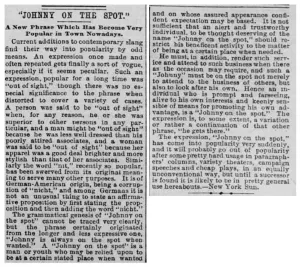 What was said? “What is it when there’s no right answer to the question? A Hobson’s Choice?”
What was said? “What is it when there’s no right answer to the question? A Hobson’s Choice?”
Did someone really say that? Yes, at work the other day, when presented with two options, neither being good ones, a coworker asked that question aloud…
What does it mean? It actually means a question where really only one option is offered, so you have to “take it or leave it” so to speak. It gives a false illusion of a “choice.”
Origin: The story goes that a Thomas Hobson (1544–1631) ran a carrier and horse rental business in Cambridge, England, where he rented out horses but refused to hire them out other than in the order he chose. The choice he gave his customers was ‘this or none’; quite literally, meaning not their choice but Hobson’s choice.
A well known “Hobson’s choice” was Henry Ford’s offer of the Model-T, “you can pick any color, as long it’s black!” The expression is best known in the UK, but became used worldwide following the successful eponymous 1954 film starring Charles Laughton.
NOTE: I believe the use of “Hobson’s Choice” when I first heard it was not accurate, it was more of a “Morton’s Fork” which is being presented with two equivalent choices in which contradictory arguments lead to the same conclusion.
Sources:
http://www.merriam-webster.com/dictionary/Hobson’s%20choice
http://www.phrases.org.uk/meanings/hobsons-choice.html
https://en.wikipedia.org/wiki/Hobson%27s_choice
https://en.wikipedia.org/wiki/Morton%27s_fork
http://tvtropes.org/pmwiki/pmwiki.php/Main/MortonsFork
REFERRALS: Do you LOVE Rema’s Idiom Blog and look forward to it all the time? If so, refer your friends!







